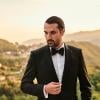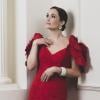
Soprano Asmik Grigorian grew up in a musical home. Her father is Armenian tenor Gegham Grigorian, and her mother is Lithuanian soprano Irena Milkevičiūtė.
It was perhaps inevitable that their daughter became an opera singer as well. Asmik Grigorian is a star of European stages, but only this year did she make her Metropolitan Opera debut, singing Cio-Cio-San in Puccini’s Madame Butterfly. Critics became a little cross-eyed with delight at her performance, praising not only her voice (which has been described as “velvet-wrapped steel” and “molten lava”) but also her acting (calling it nuanced, skilled, and spontaneous). Romeo Castellucci, who directed Grigorian in Richard Strauss’s Salome at the 2018 Salzburg Festival, said the soprano was “ideal” and “Salome incarnate.”
Now, Grigorian is coming to the West Coast for the first time. She and pianist Lukas Geniušas are set to appear at Cal Performances on Dec. 15, bringing an all-Russian program of songs by Tchaikovsky and Sergei Rachmaninoff.

Grigorian spoke with SF Classical Voice on a video call at midnight her time after she had finished performing the title role in Antonín Dvořák’s Rusalka at the Teatro San Carlo in Naples. The soprano talked about not having favorites (in music or in life), how she gets goosebumps singing at venues where her father performed, and her Met debut. This conversation has been edited for clarity and concision.
I read that growing up you didn’t want to be an opera singer. Was there a certain point when you changed your mind?
I think when I was a teenager, I didn’t want to become anything [in particular], so it was just step-by-step that I ended up where I am. But I remember when I thought maybe it would be something for me. It was 2004, Don Giovanni with [stage director] Jonathan Miller, and it was the first production onstage for me, and I thought, “OK, this probably could be something interesting.” Then I thought, “I need to make it big in opera, and then I can sing some different music. Because otherwise, if I sang some different music before that, [people] would probably think, ‘Oh, she could not sing opera, and that’s why she went for pop music or whatever.’”
That’s what I thought — I don’t know why. I decided I needed to make [a career] in opera and then I could do whatever I wanted. And finally, I think it was 2019, it was my debut at La Scala [as Marietta in Erich Wolfgang Korngold’s Die tote Stadt] and I thought, “I did it. Now I can do whatever I want.” Then I understood that I already do what I want.
I read that director Romeo Castellucci thought your acting as Salome was so nuanced that you just became the character. How do you prepare for a role?
I was actually never thinking about character. In any single role I play, I mainly prepare technically [and] musically, and somehow the role, it comes [by] itself. All the roles I’ve done, it was always me, [just] in particular circumstances. So I never think of a role as a separate character from me.

Colleagues and critics have talked about what a wonderful actor you are, but you’re saying that’s not something you trained in — that you just imagine how you would be in a given situation?
It’s difficult to say that I was not trained because I’ve been onstage for 20 years. For 20 years, I’ve been in opera, working with the best directors of our day. So to say that I was not trained, that’s not really true.
Castellucci also talked about how you had such great vocal color. What does that mean to you?
I mean, if we talk about Salome, probably he meant because Salomes are usually sung by way more dramatic voices. He probably meant the lyrical color of the young girl [that I brought to the role]. That was the challenge for me: to keep this very childish and lyrical color but at the same time have this dramatic emission able to [cut] through this huge orchestra.
What did it mean to you to be at the Met in Madame Butterfly?
Honestly, first of all, I came to the Met with one of my favorite roles, which is really under my skin because of my mom. So that was very special for me. Also, the feeling of being at the Met [itself] was very special because it was probably the last big stage which I hadn’t performed on, and I came to the Met already with the status of kind of a star. That’s why it was so interesting because it felt like when I was stepping on the stage, I was bringing with me all those 20 years and every single person who [had] helped me.
What do you like most about being an opera singer?
Probably what I like the most [is] that it’s an everyday challenge. You need to grow every single day.
Every single day, I push my limits. Every single day, I push myself to become a better version of myself. This constant growing as a human being, as an artist — that’s probably the biggest thing I like about this profession. It’s a profession where in one life, I can live so many lives. I can learn so many things from my roles. Also, I meet incredibly beautiful people, and I see beautiful places.

Who is your favorite composer to sing?
I don’t have any favorites in my life, neither composers nor singers nor books nor movies. Really, I have such a huge appetite for life, and there are so many things I do like, so there are no favorites.
You’ve won a lot of awards, including recently the Grand Jury Prize at the Austrian Music Theater Awards. Is any award particularly meaningful to you?
It’s like the favorites. They all mean a lot. Sometimes it feels like a miracle. Since September, I’ve gotten three awards. So I think sometimes I don’t even have enough time to [relax] and enjoy what I do because I [am still] constantly doing and doing and doing. So I [recently] decided that it’s time to make a bit of space in my life to be able to enjoy.
Speaking of doing a lot, you’ve portrayed roles from Tatyana in Tchaikovsky’s Eugene Onegin to Mrs. Lovett in Sondheim’s Sweeney Todd. Was that latter one fun?
That was amazing. I always say this role, I really need to repeat it because, you know, when I was learning Sweeney, I could not speak a single word in English. So it was a huge challenge for me. [Laughs.]
The program you’re doing with Lukas Geniušas at Cal Performances is all Russian. Why did you choose this repertoire?
It’s the program of the CD which we recorded [in 2021, Dissonance]. After Salome, there were many proposals of doing recordings. I didn’t have anything prepared, and then I remembered that I had dreamed to record all the Rachmaninoff songs in the original keys. Then I said, “OK, I want to record it with Lukas.” It was very accidental, step-by-step.
Before coming to California, you’re performing at Carnegie Hall. How are you feeling about that?
It’s a very interesting feeling. In Europe, I’m a pretty big star, and people know me, and it’s so interesting to come to America already having the status. So I don’t have so much nerves about performing. But at the same time, it gives me so much joy and pleasure to see different stages, to be in particular places where my father was. It always gives me goose bumps, and it means a lot.




